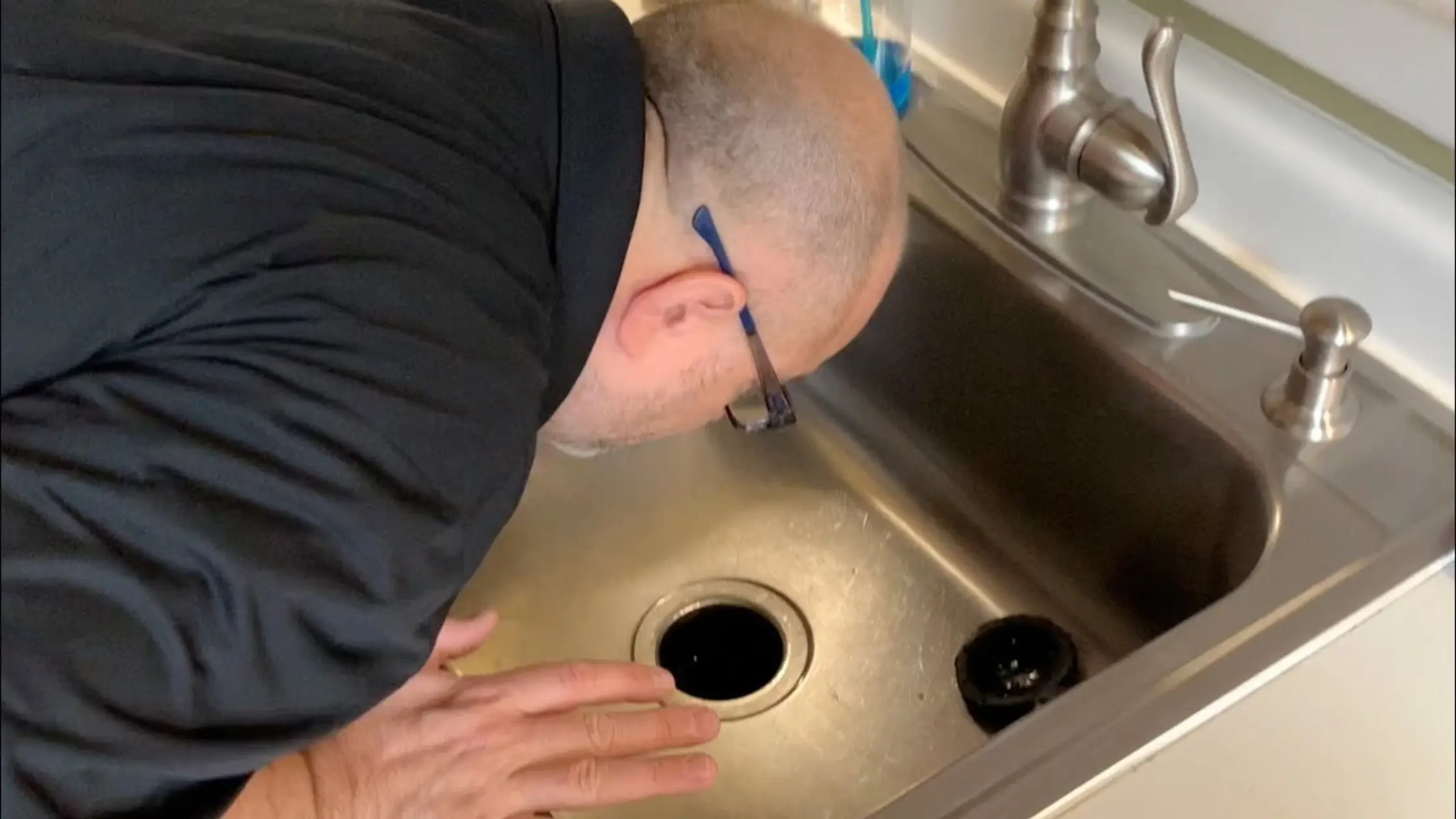If your house smells like sulfur or you’ve noticed a persistent rotten egg smell in house, you’re not alone—and you shouldn’t ignore it. That unmistakable stench is often a sign of hydrogen sulfide gas, a potentially hazardous compound that can stem from plumbing issues, water contamination, or even sewer gas leaks.
This guide from Priscilla’s Plumbing, South Florida’s trusted plumbing experts, breaks down everything you need to know about the rotten egg smell in house—from causes and health risks to room-specific troubleshooting and proven fixes.
What Is the Rotten Egg Smell in the House?
That sharp, sulfur-like odor lingering in your home isn’t just unpleasant—it’s a chemical clue. The rotten egg smell often points to a hidden imbalance in your plumbing or air quality, signaling that something deeper may be brewing behind the walls or beneath the floors.
Understanding Hydrogen Sulfide Gas
The rotten egg smell in the house is most commonly caused by hydrogen sulfide gas (H₂S). This gas is produced when organic matter decays in low-oxygen environments—like stagnant water, clogged drains, or sewer systems. It’s colorless, flammable, and toxic at high concentrations.
Common Sources of Hydrogen Sulfide Indoors
- Sewer gas leaks from cracked pipes or faulty seals
- Bacterial growth in water heaters or plumbing systems
- Contaminated groundwater—especially in homes with well water
- Dry plumbing traps that allow gases to enter living spaces
Even at low concentrations, hydrogen sulfide can cause irritation and discomfort. At higher levels, it becomes dangerous.
Why Does It Smells Like Rotten Eggs?
Hydrogen sulfide has a pungent, sulfur-like odor often described as:
- Rotten egg odor indoors
- Sulfur smell in house
- House smells like sulfur
- Sewer gas smell in house
These variations often point to the same underlying issue: hydrogen sulfide presence.
Rotten Egg Smell in Drains, Sinks, or Bathrooms
When the stench seems to rise from your fixtures, it’s not just bad luck—it’s biology. Drains and sinks can become breeding grounds for anaerobic bacteria, which release sulfur compounds as they feed on trapped waste. The smell is your nose’s way of alerting you to a microbial mess.

Why Your Bathroom Smells Like Rotten Eggs
Bathrooms are a hotspot for sulfur smells due to the convergence of water, organic waste, and plumbing fixtures. If your bathroom smells like rotten eggs, the issue could stem from:
1. Dry or Faulty P-Traps
P-traps are U-shaped pipes under sinks and tubs that hold water to block sewer gases. If they dry out (common in guest bathrooms), gases seep into the room.
2. Bacterial Growth in Overflow Holes
Overflow holes in sinks can harbor bacteria that produce hydrogen sulfide. These areas are often overlooked during cleaning.
3. Clogged or Slow Drains
Organic buildup (hair, soap, skin cells) feeds bacteria that release sulfur compounds.
4. Toilet Seal Leaks
A broken wax ring under the toilet can allow sewer gas to escape into the bathroom.
Is Rotten Egg Smell in Bathrooms Dangerous?
Yes. While low levels may cause discomfort, prolonged exposure can lead to:
- Eye and throat irritation
- Headaches and nausea
- Aggravated asthma or respiratory conditions
In rare cases, high concentrations of hydrogen sulfide can be fatal—especially in enclosed spaces.
Quick Fixes for Bathroom Odors
- Run water in unused fixtures weekly
- Clean overflow holes with vinegar and baking soda
- Use enzyme-based drain cleaners
- Replace faulty toilet seals
- Call Priscilla’s Plumbing for a full inspection
What Does It Mean If My Sink Smells Like Sulfur?
A sulfuric odor from your sink isn’t random—it’s a symptom of chemical reactions happening in your water system. Whether it’s a corroded anode rod or stagnant water in the pipes, this smell often reveals how your plumbing is aging or reacting to environmental conditions.
Sink-Specific Causes of Rotten Egg Odor
- If your sink smells like sulfur, it’s likely due to bacterial activity or plumbing issues. Here’s what to check:
1. Biofilm Buildup
- Biofilm is a slimy layer of bacteria that forms in pipes. It feeds on organic matter and releases hydrogen sulfide.
2. Water Heater Contamination
- If the smell worsens when using hot water, your water heater may be the culprit. Sulfur bacteria thrive in warm tanks, especially with magnesium anode rods.
3. Ventilation Problems
- Improperly vented plumbing systems can cause pressure imbalances, forcing sewer gas back into sinks.
How to Get Rid of Sulfur Smell in House from Sinks?
- Flush drains with boiling water and baking soda
- Replace corroded anode rods with aluminum-zinc alternatives
- Inspect and clear vent stacks
- Install point-of-use filters if water contamination is confirmed
Sulfur Smell in Shower or Drains – What to Check?
Showers and floor drains are often overlooked until they start to smell like a chemistry lab. The odor may stem from dried-out traps, poor ventilation, or even mold colonies thriving in damp corners. These areas deserve a closer inspection before the smell spreads.
Shower Drain Troubleshooting
Showers are prone to sulfur smells due to:
- Hair and soap scum buildup
- Dry traps in infrequently used bathrooms
- Improper slope causing water stagnation
- Mold or mildew in tile grout or caulking
Solutions for Shower Drain Odors
- Use drain snakes to remove buildup
- Pour enzyme cleaner monthly
- Re-seal tile grout and caulking
- Ensure proper trap seal depth (2–4 inches)
Local Tip for South Florida Homes
High humidity accelerates bacterial growth. Use dehumidifiers and exhaust fans to reduce moisture in bathrooms. For recurring clogs that contribute to sulfur smells, our expert drain cleaning services offer fast, effective relief using hydrojetting and safe enzyme treatments.
If you suspect the smell is seeping up from beneath your floors, a professional slab leak detection can uncover hidden pipe damage before it worsens.
Rotten Egg Smell in House but No Gas Leak

If the air reeks of sulfur but your gas lines check out clean, the mystery deepens. This scenario often points to non-combustible gases like hydrogen sulfide sneaking in through plumbing vents, septic systems, or even contaminated groundwater—none of which involve a gas leak.
Causes Without a Natural Gas Leak
If your house smells like sulfur but no gas leak is detected, the issue may be:
- Sewer gas intrusion from cracked pipes or dry traps
- Contaminated water supply—especially in homes with well water
- Bacterial growth in plumbing systems or water heaters
- Environmental factors like high humidity and poor ventilation
Rotten Egg Smell in Home Water
Water heaters are frequent offenders. Sulfur bacteria feed on magnesium in anode rods, releasing hydrogen sulfide.
Fixes for Water-Based Odors
- Flush and disinfect water heater
- Replace anode rod with aluminum-zinc alloy
- Install activated carbon filters
- Test water for sulfur bacteria and iron levels
Rotten Egg Smell and Health Effects
That foul smell isn’t just a nuisance—it’s a warning signal. Prolonged exposure to sulfur-based gases can irritate your lungs, dull your senses, and trigger headaches. Understanding the health implications helps you treat the odor as more than just an inconvenience.
Is Rotten Egg Smell Dangerous?
Yes. Hydrogen sulfide is toxic and can cause serious health issues depending on exposure level and duration.
Short-Term Effects
- Eye, nose, and throat irritation
- Headaches
- Dizziness
- Nausea
Long-Term Effects
- Respiratory damage
- Fatigue
- Neurological symptoms
- Loss of consciousness (in high concentrations)
Smell of Sulfur in House: Health Risks
Children, elderly individuals, and those with respiratory conditions are especially vulnerable. If symptoms appear, ventilate the area and seek medical attention.
When to Call a Professional?
If the smell is strong, persistent, or accompanied by symptoms, contact Priscilla’s Plumbing immediately for inspection and remediation.
Causes of Rotten Egg Smell with No Gas Leak
When gas isn’t the culprit, the list of suspects grows longer. From decomposing organic matter in your pipes to faulty water heaters and sewer venting issues, the rotten egg smell can be traced to a variety of overlooked sources that mimic the scent of gas without the danger.
Hidden Plumbing Issues
Even without a gas leak, sulfur smells can stem from:
- Cracked sewer lines under the foundation
- Improperly sealed toilet flanges
- Blocked or damaged vent stacks
- Septic system backups
Environmental Factors
- High humidity accelerating bacterial growth
- Poor air circulation trapping odors
- Seasonal changes affecting water chemistry
Diagnostic Checklist
- Check all drains for flow and smell
- Inspect water heater and anode rod
- Look for signs of mold or mildew
- Test water supply for sulfur compounds
Comparison: Sewer Gas vs. Natural Gas
Though they share a similar stench, sewer gas and natural gas are worlds apart in origin and risk. One is a byproduct of waste decomposition, the other a fuel source. Knowing how to distinguish them can save you from unnecessary panic—or alert you to a real hazard.
| Feature | Sewer Gas (H₂S) | Natural Gas (Methane + Additives) |
| Smell | Rotten eggs / sulfur | Rotten eggs (due to mercaptan) |
| Source | Decay, plumbing, sewage | Utility lines |
| Health Risk | Moderate to high | High (explosive) |
| Detection | Smell, symptoms, gas detectors | Utility company, detectors |
| Fix | Plumbing repair, ventilation | Emergency gas shutoff, utility fix |
How to Get Rid of Sulfur Smell in House?
Clearing the air starts with pinpointing the source. Whether it’s flushing your drains, replacing corroded parts, or treating your water supply, removing the sulfur smell requires a tailored approach—not just masking it with air fresheners. Let’s tackle it the right way.
Step-by-Step Remediation Plan
1. Identify the Source
- Is it localized to one room?
- Does it worsen with water usage?
- Is it stronger near drains or vents?
2. Clean and Flush Drains
- Use baking soda + vinegar
- Follow with boiling water
- Repeat weekly
3. Inspect Water Heater
- Flush tank
- Replace anode rod
- Consider professional disinfection
4. Seal Plumbing Fixtures
- Check toilet seals
- Re-caulk sinks and tubs
- Ensure trap integrity
5. Improve Ventilation
- Open windows
- Use exhaust fans
- Install air purifiers
6. Call Priscilla’s Plumbing
If DIY fixes don’t work, our licensed plumbers will inspect, diagnose, and eliminate the odor at its source.
Rotten Egg Smell in Basement: Causes and Fixes
Basements are often the first place where sulfur odors accumulate unnoticed. If you detect a rotten egg smell in house, especially in the basement, it may be due to:
Common Basement-Specific Causes
- Cracked sewer lines beneath the foundation
- Dry floor drains that allow sewer gas to rise
- Sump pump contamination from stagnant water
- Mold and mildew growth in humid corners
- Improperly vented appliances like water heaters or furnaces
Why South Florida Basements Are Vulnerable?
In humid regions like South Florida, basements are prone to moisture retention, which accelerates bacterial growth and gas release. Poor ventilation compounds the issue, trapping the hydrogen sulfide smell in house.
How to Fix It?
- Pour water into dry floor drains weekly
- Seal foundation cracks with epoxy or hydraulic cement
- Clean sump pump pits and install airtight lids
- Use dehumidifiers and exhaust fans
- Schedule a plumbing inspection with Priscilla’s Plumbing
Rotten Egg Smell from HVAC or Air Vents
If the rotten egg odor indoors is strongest near air vents, your HVAC system may be circulating contaminated air.
HVAC-Related Causes
- Sewer gas intrusion into ductwork
- Contaminated condensate drain lines
- Natural gas leak near furnace or water heater
- Mold growth in air handler or ducts
Signs to Watch For
- Smell intensifies when HVAC is running
- Odor present in multiple rooms simultaneously
- Increased allergy symptoms or respiratory irritation
How to Fix It
- Clean or replace HVAC filters monthly
- Flush condensate drain lines
- Inspect ductwork for leaks or mold
- Shut off gas supply and call utility company if leak is suspected
- Book an HVAC-safe plumbing inspection with Priscilla’s Plumbing
Drywall and Building Materials as a Source
In rare cases, the sulfur smell in house may originate from the building materials themselves—especially drywall imported from certain regions.
H3: What Is “Gassy Drywall”?
Some drywall manufactured overseas contains sulfur compounds that off-gas over time, especially in warm, humid climates. This can corrode copper pipes and wiring, and emit a rotten egg smell in house.
Signs of Problematic Drywall
- Blackened copper pipes or electrical wires
- Persistent sulfur odor despite plumbing fixes
- Corrosion on HVAC coils or refrigerator tubing
What to Do?
- Hire a certified inspector to test drywall composition
- Replace affected drywall sections
- Install air purifiers with activated carbon filters
- Monitor indoor air quality regularly
Rotten Egg Smell in Well Water Systems
If your home uses well water, the rotten egg smell in home water may be due to sulfur bacteria or iron bacteria.
Causes in Well Systems
- Anaerobic bacteria reacting with magnesium in water heaters
- High sulfur content in groundwater
- Iron bacteria producing slime and odor
How to Diagnose?
- Smell only present when using hot water
- Odor strongest near faucets or showerheads
- Water appears cloudy or discolored
How to Fix It?
- Shock chlorinate the well system
- Replace water heater anode rod with aluminum-zinc
- Install oxidizing filters (manganese greensand or chlorine injection)
- Use point-of-entry activated carbon filtration
Local Tip
South Florida’s aquifers can vary in mineral content. Annual water testing is recommended for homes using private wells.
Rotten Egg Smell in New Construction Homes
Even new homes can emit sulfur odors due to overlooked plumbing or material issues.
Causes in New Builds
- Unvented plumbing systems
- Unused fixtures with dry traps
- Off-gassing from new materials
- Improper water heater setup
What to Check
- Run water in all fixtures weekly
- Inspect vent stacks and trap seals
- Flush water heater and test water quality
- Ask builder for plumbing schematics
Unexplained moisture or odor near walls or flooring may require advanced water leak detection to pinpoint the source and prevent long-term damage.
When to Call Emergency Services vs. a Plumber?

Not all sulfur smells are created equal. Knowing when to call Priscilla’s Plumbing vs. emergency services can protect your home and health.
When to Call Emergency Services?
- Smell is accompanied by dizziness, nausea, or unconsciousness
- You suspect a natural gas leak (not just sewer gas)
- Gas detectors are triggered
- Odor is near gas appliances or utility meters
When to Call Priscilla’s Plumbing?
- Odor is strongest near drains, sinks, or bathrooms
- Smell worsens with water usage
- You’ve ruled out natural gas leaks
- You suspect sewer gas or water heater contamination
Homes with aging infrastructure may experience sulfur odors due to corroded pipes—our cast iron plumbing services specialize in trenchless repair and full replacements.
Safety First
If in doubt, evacuate the home and contact your local utility provider. Once cleared, Priscilla’s Plumbing can perform a full diagnostic and remediation. If you’re located in Oakland Park and need fast odor diagnostics, our licensed plumber Oakland Park team is available 24/7 for emergency service.
Why South Florida Homes Prone to Rotten Egg Smells?
Climate and Plumbing Factors
- High humidity encourages bacterial growth
- Older homes may have outdated plumbing
- Well water systems are more common
For residents in Pompano Beach dealing with persistent drain odors, our local plumber Pompano Beach experts offer same-day inspections and repairs.
Priscilla’s Plumbing Knows South Florida
We specialize in identifying and fixing sulfur smells in Fort Lauderdale, Coral Springs, Weston, and surrounding areas. If the odor is coming from deep within your plumbing system, scheduling a sewer line cleaning can help eliminate trapped gases and restore proper flow.
Psychological Effects of Persistent Odors
Beyond physical health, persistent rotten egg smell in house can affect mental well-being.
Psychological Impact
- Stress and anxiety from unresolved odors
- Sleep disruption due to discomfort or worry
- Reduced indoor comfort and quality of life
- Embarrassment when hosting guests
How to Mitigate?
- Use HEPA and activated carbon air purifiers
- Improve ventilation in affected rooms
- Keep a log of odor intensity and timing
- Seek professional help to eliminate the root cause
Rotten Egg Smell Timeline: What It Means
Understanding how long the odor has persisted can help pinpoint the cause.
| Duration of Smell | Possible Cause | Action Needed |
| A few minutes | Dry trap or minor drain issue | Flush with water |
| Hours | Water heater or biofilm buildup | Inspect plumbing |
| Days | Sewer gas leak or water contamination | Call plumber immediately |
| Weeks | Structural or environmental issue | Full home inspection |
If you’re in Fort Lauderdale and noticing a rotten egg smell near your water heater or bathroom, contact our trusted plumber Fort Lauderdale for a full plumbing evaluation.
Call Priscilla’s Plumbing to Eliminate Rotten Egg Smell in House
Don’t let a rotten egg smell in house ruin your comfort or risk your health. Whether it’s your bathroom, kitchen sink, or water heater, our expert plumbers will find the source and fix it fast.
Lighthouse Point homeowners experiencing sewer gas smells can rely on our responsive plumber Lighthouse Point team for odor elimination and pipe restoration. For Wilton Manors properties with sulfur smells in multiple rooms, our experienced plumber Wilton Manors crew can diagnose and fix the issue with minimal disruption.
📍 Serving South Florida | 💬 Free Estimates | 📞 Call Now
FAQs About Rotten Egg Smell in House
Q1. Why does my house smell like rotten eggs only at night?
Odors may intensify when HVAC systems cycle or when water usage is low, allowing gases to accumulate.
Q2. Can a rotten egg smell mean a gas leak?
Yes—but if utility companies rule out natural gas, it’s likely sewer gas or water contamination.
Q3. Is it safe to stay in a house that smells like sulfur?
Short-term exposure may be safe, but long-term exposure can be harmful. Ventilate and seek help.
Q4. Will air fresheners help?
They may mask the smell temporarily but won’t eliminate the source. Plumbing fixes are essential.









